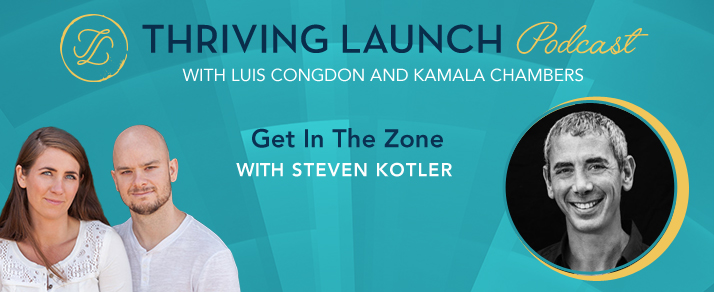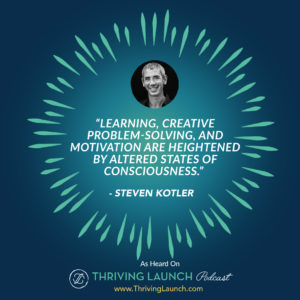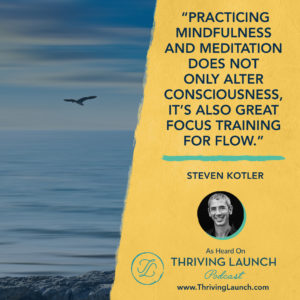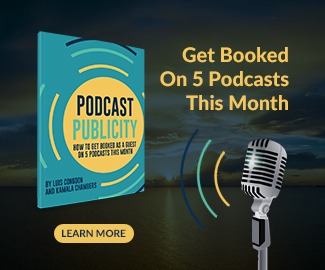Get In The Zone – Steven Kotler

Do you want to know how to get in the zone and be more productive? Accessing that flow state can help you live a better life and be creatively inspired everyday.
Steven Kotler, a New York Times Best-Selling Author, and the co-founder of the Flow Genome Project, explains what flow is and how it can help you get in the zone.
![]() Flow is an optimal state of consciousness where we feel our best and perform our best.
Flow is an optimal state of consciousness where we feel our best and perform our best.
![]() William James pointed out that altered states seem to unlock incredible levels of insight, intuition, inspiration, and creative problem solving.
William James pointed out that altered states seem to unlock incredible levels of insight, intuition, inspiration, and creative problem solving.
![]() Learning, creative problem solving and motivation, are heightened by altered states of consciousness.
Learning, creative problem solving and motivation, are heightened by altered states of consciousness.
![]() Music can be used to alter state.
Music can be used to alter state.
![]() Research shows that the most crucial thing for creativity or productivity is turning off everything that could distract you, and focus.
Research shows that the most crucial thing for creativity or productivity is turning off everything that could distract you, and focus.
![]() You can use mindfulness and respiration practices as training for focus.
You can use mindfulness and respiration practices as training for focus.
![]() Accessing altered states of consciousness to get in the zone can be done through different techniques.
Accessing altered states of consciousness to get in the zone can be done through different techniques.

Luis Congdon
Flow is that state when you just get more done, help you get in the zone, and it’s almost like you forget about time and life. You’re just doing whatever is in front of you, and you magically know what to do and how to do it, and you get a lot more done.
If you would like to enter the flow state and get in the zone more often, Today’s episode, we’re going to discuss that, and we’re going to teach you some steps and methods that will help you enter that flow state and get in the zone with more ease and more consistency. Not only that, we’ve brought on the leading mind to discuss what the flow state is, what the altered states of consciousness are, and how you can benefit from it.

Kamala Chambers
Steven Kotler is a New York Times Best-selling author, an award-winning journalist, and the co-founder Director of Research for the Flow Genome Project.
He is one of the world’s leading experts on ultimate human performance.

Luis Congdon
All right. Thriving launchers, we are here with Steven Kotler talking about how to get in the zone.
Steven, are you ready to launch into how to get in the zone?

Steven Kotler
Ready to launch captain. Let’s get in the zone.

Luis Congdon
I love it.
One of the things that I love about your work is that you tapped into something extraordinary, and you found a way to give language to it. You’ve become one of the leaders in talking about flow states, how to get in the zone, and high performance.
Now, you have this new book, Stealing Fire, which I’m very excited about. You sent me an early release, and I’m looking forward to sitting down and diving into that. I’m familiar with your work in The Rise of Superman.
Now, you’ve done something different because, in Superman, you talked about flow and these states of consciousness and how to get in the zone that we can get in to be exceptional performers. Now, with Stealing Fire, you’ve done something different.
Can you tell us a little bit about that?
How To Get In The Zone

Steven Kotler
Yeah.
First of all, thank you. It is good to hear that my work has had an impact. I appreciate that very much. That is nice for you to say.
Stealing Fire, probably the easiest way to jump in here is to tell you what we were seeing. My partner, Jamie Wheal and I co-founded the Flow Genome Project and the book urge out of that.
After Rise of Superman had come out, we were spending a tremendous amount of time running around the world talking about flow and how to get in the zone, which is an optimal state of consciousness, where we feel our best and perform our best. It’s a non-ordinary state of consciousness.
It didn’t matter where we were. We could be the Navy Seals, in Silicon Valley, or with the Fortune500 Company. After we were done presenting on flow, people are coming to us, and they’re saying, “Flow is great. It’s a phenomenal tool for high performance but our whole team is going to silent meditation retreats on a regular basis, or we’re all micro-dosing with psychedelics to improve our creativity on a regular basis.” Or, “We’re all going skydiving to produce even more flow and get in the zone on a regular basis.” It went on and on.
We started to realize that wherever we look, people were starting to utilize a full sweep of non-ordinary states of consciousness to improve performance radically. My partner, Jamie Wheal, started to say “Hey, you know. This looks a little bit like a revolution.” I was like, “Not so fast. Let’s kind of work with others and see what we can find.”
The deeper we dug and the more we dug, the bigger this revolution started to grow until we realize that was an appropriate term of what’s going on in the world today.
Non-Ordinary States To Get In The Zone

Kamala Chambers
I want to hear a little bit more about how non-ordinary states of consciousness are affecting our productivity.

Steven Kotler
Okay.
Let’s back all the way up to William James. William James was a Harvard psychologist, philosopher, physiologist, physician, and considered by many the founder of American psychology. In 1902, William James noticed, doing a 30-year global study of what he called “Mystical experiences “which was his catchall term for a whole bunch of different altered states of consciousness.
By his definition, the term referred to everything from awe, and flow states to get in the zone, to meditative and contemplative states, to psychedelics states, to act to things. Things that if we don’t call the mystical, we at least call the mysterious like out of body experiences, near death experiences, trance states, and the like.
What he noticed way back is it didn’t matter what technique you were using. It didn’t matter who you’re talking; a Buddhist monk meditating who’s in a cave, a mid-Western Quaker at a Quaker prayer circle, a shaman on psychedelics, or even a philosopher having a moment of “Aha” insight. The feeling produced by the act of the ineffable was very similar, and that feeling had a real impact.
He pointed out way back then that in these states, they seem to unlock incredible levels of insight, intuition, inspiration, creative problem solving, etc. And, afterward, people were fundamentally different. Being in these states made their lives richer. They had more meaning and felt more alive. These states seem to heal trauma, reduce anxiety, and other stuff like that.
Your Unique Approach To Get In The Zone

Steven Kotler
It turns out James was exactly right. We spent the past hundred years proving that to ourselves over and over again. I think it is safe to say that the fact that altered states of consciousness are incredibly useful for us has become one of the most well-proven facts in psychology backed up by 50 years of data from neuroscience and 30 years of data from a half a dozen other sciences.

Kamala Chambers
Is there a common thread between an altered state and what creates the most productivity? Or is it individualistic? Does it depend on who the person is what state works best for them?

Steven Kotler
First, I want to back up.
Productivity is a funny word. For example, we know because McKinsey did a ten years study on top executives. The top executives in a flow state that get in the zone are 500% more productive than normal.
Now, what is actually under the hood of that productivity? Where does that come from? That’s an interesting question. Productivity is a very weird thing to measure. A lot of people argue it is accelerated learning, heightened creative problem solving, or increased motivational.


Steven Kotler
There’s a reason by the way. This isn’t just a grab bag of states of consciousness even though it sounds like one.
What we’ve discovered over the past 10 to 12 years as neuroscience has started to come of age is that when you dig under the hood of these experiences, they are rough of the same experiences. The same kind of knobs and levers in the brain are being tweaked. So it’s not one to one, but it’s roughly the same.
Does Coffee Work To Get In The Zone

Steven Kotler
Now, with that said to get to your question, does this stuff differ individual to individual? I think so, and a lot of people seem to think so. What we know about genetics appears to suggest that it’s true. What we are aware of the nurture side of the argument or the epigenetic aspect of the argument also seems to suggest that it’s true. But, I don’t know if anybody has exactly looked at it especially under the question of productivity as you’ve raised it.
It’s a cautious yes to your question, but I want to try for some accuracy especially at the start of this conversation. I think that’s important.

Kamala Chambers
One of the reasons I asked that is I’m always looking for the way that I perform the best where I can tap into those flow state, get the most done, and in the most enjoyable way possible.
One thing that I found works well for me is I use coffee in a controlled way. I take one shot of espresso with an epic deeply emotional playlist in a very busy environment. I use to combine those three things, and that’s where I get the most productivity where I can get into those states for extended periods of time. But that’s not going to work for everyone.
So, I’m just curious. What other ways have you found that maybe we could all try to alter our state to increase productivity?

Steven Kotler
If you’re aiming directly to productivity, specifically, on a particular level, you’re targeting a flow to get in the zone. But, let’s start at the beginning and talk about why your exact hack happens to work for you.
Coffee is a focusing mechanism. It raises energy, drives focus, drives some of the same neurobiological changes that the altered state that we’re talking about, and surprise you of the playlist. We talked about this at Stealing Fire.
Get In The Zone With Music

Steven Kotler
There are all kinds of amazing research on music stability to shift consciousness. Does everything from change brain waves to drive neurochemical release to change which parts of the brain are active. I’m assuming that you’re putting on headphones in your little private playlist world.

Kamala Chambers
Yeah.

Steven Kotler
You’re doing a couple of things there. Not only are you using music as a state altering technology but you’re also blocking out the world.
Research consistently shows that the most important thing for creativity or productivity is shut off your phone, shut off social media, turn off everything that could distract you, and focus.
The research shows that you have to concentrate on a single task for 90-120 minutes, depending on who you look at. If you’re trying to do something creative, some people including I think Tim Ferris, has this four-hour windows. I heard a lot of people talking about that sort of thing.
For starters, just digging under the hood of what you’re doing. All those things are important. Now, people who practice mindfulness or meditation, phenomenal focus training to enhance any of this stuff.


Steven Kotler
So you can use mindfulness practices, respiration practices as training for focus which drives flow to get in the zone.
There’s a lot of ways to train for focus to drive flow to get in the zone depending on who you are and how you are.
Get In The Zone With The Right Environment

Steven Kotler
There are 20 different flow triggers to get in the zone. If you go to my website stevenkotler.com, you can sign up for my email newsletter, and I’ll give a free PDF breakdown of all the triggers and how they work, and the easiest way, and what we’ve seen over and over with top performers is they build their lives around this triggers.

Luis Congdon
I like that you’re talking about triggers.
It reminds me of in college, the way that I studied was I tried to study in environments that were quite similar to being in the classroom. One of my teachers talk about high performance during test, and it was something that I used to struggle with.
Anytime I had a test, I used to start sweating. I get very nervous and anxious, and I wouldn’t do that well. So, I tried to hack into that process and become better at test taking, which I did end up getting a lot better.
One of the things that I was told is that if you can study in an environment that is similar to that of which where you’ll be taking your test, that will help you and it will help you zone in.
Unlike Kamala, I didn’t go to busy places. I went to places that were lot like classrooms, and I also tried to study in an hour or 2 hour block periods as well.

Steven Kotler
You’re talking about State Dependent Learning, which is the idea that you’d wear a blue sweat while you study for your med CAT. You should take the med CAT in blue sweats, and it works the same with the environment. I have done both.
Can Marijuana Help Get In The Zone?

Steven Kotler
When I was in college, even in the grad school, I wrote in very noisy bars. In fact, my first novel The Angle Quickest for Flight, I wrote the first draft of it sitting in a bar. Because I live very far away from campus and I was a bartender. So rather than go home, I would often pose up in the corner of the bar that I was working in, work for four or five hours on my book and then get up and tend bar for a couple of hours. I have found that works for me. It works for a lot of you.
I think Malcolm Gladwell does always work in public. A bunch of other people I’ve heard of does it as well, but state dependent learning works remarkably well. It even works with altered states of consciousness.
This is an interesting random detail. One of the things that have come out of the study of marijuana and the reason people tend to miss that marijuana can function as a performance enhancing drug is because marijuana tends perforce states specific learning. Anandamide is the neurochemical underneath of marijuana that is also there in flow to get in the zone.
What happens in high schools is people start smoking pot with their friends and eating Cheetos, and watching movies. What they’re training their brain to do once stoned is eat Cheetos and watch movies. So they’re never realizing that if you train the brain to focus and be creative and write poetry or etcetera, you’re looking at a state changing performance enhancing drug.
I think opinion here maybe a bit of a volatile one, but I believe one of the reasons that we’re seeing marijuana legalizations sweeping the country is more and more people seem to be using it as a performance enhancing drug.
Rumors About How To Get In The Zone

Steven Kotler
There are stories leaking out of Silicon Valley about how they’re having problems with this new form of smoke break, and who is budging outside to get stoned and coming back, and they’re more productive, and what exactly do you do?

Luis Congdon
That’s a hard one for bosses to manage it for them to figure out the answer.
There’s a rumor among English literature graduates that Shakespeare smoked pot as well. It’s an interesting little thing out there.

Kamala Chambers
I don’t buy that one.

Luis Congdon
She doesn’t buy that.

Steven Kotler
All I know is the guy invented like a third of the English language.

Luis Congdon
That’s right.

Steven Kotler
That is amazing considering how many people have their crack at English before Shakespeare came along, and if you just invented so many words, it’s astounding.

Luis Congdon
Well, we’ll have quite a conversation if we open that conversation up. That is part of my flow state to get in the zone is talking about literature, English literature, and writers. I love it.
One of the things that I’m curious about because that in your new book Stealing Fire, you talk about these altered states and how it’s creating what you called the Trillion Dollar industry or something earlier before the interview.

Luis Congdon
I’m curious about that if you can tell us a little bit more about what you mean by that.

Steven Kotler
Absolutely.
When we were researching flow, we had to put together a giant list of every bit of neuroscience surrounding flow. Where did it come from? What could trigger in the brain and the body?
How You Get In The Zone Is A Spectrum

Steven Kotler
By the time we were done because flow is an altered state of consciousness and it sits in a spectrum with a lot of other altered states of consciousness, we started to see patterns. We began to see that the knobs and levers underpinning these states were the same. We were looking at very specific things.
All altered states of consciousness, they have some things in common, but the two things they share is the self tends to disappear. We switch the channel on ordinary waking consciousness, and the self tends to vanish, and simultaneously, we’re filled with inspiration insight and intuition. Those characteristics underpin all these states.
What we started to realize and it grew out of this funny conversation that we are having with Salim Ismail, who is the first executive president of Singularity University. We were talking about flow and how to get in the zone. He said, “It’s funny if you think about it, whenever you go to a live concert or a sporting event, you’re mainly banged to see people in flow, right?”
If you buy a ticket to see the Lakers a couple of years ago, you didn’t want to see the Lakers. You wanted to see Kobe Bryant revenge the Black Mamba. So in the zone, he was dropping 50, right? That’s what you’re paying money for. It’s the same thing when you go to the movies. You are paying to see actors in flow and they get in the zone. During poetry readings, you see poets in flow as they get in the zone.
He said, “If you quantify it, I’ll bet it’s a huge chunk of the GDP.” And this always stuck in my head. When Jamie and I were running around the country and seeing all these other people utilize all of these other kinds of altered states of consciousness, it got us curious.
Get In The Zone With Chanting

Steven Kotler
We decided we wanted to put some numbers around it.
How much money do people spend trying to turn off the voice in their head and unlock level of inspiration, and we had the neurobiology underneath the processes. Using this screening, it allowed us to filter across different demands in society, and we started to make a calculation. How much money people were spending on this stuff, and we look at every which way people could go about altering their consciousness. We call it The Altered State Economy.
We started with the obvious like the 2.3 trillion dollars people spend on illicit and licit drops, and the 182 billion people spend on psychoactive drug called Pharmaceuticals. We also look at all the things people try to alter the state of consciousness like psychology, coaching, self-help. Not really like skills at position training, but we focused on anything that has helped me changed the channel in my head, helped me feel better.
We were also trying to be conservative. Here’s another example. Whenever we go to a live music event, we’re hunting state change. We’re chasing that losing myself in the music, losing myself in the band, losing myself in the crowd, the feeling called Communitas. But we said, “Okay, that’s maybe too big for us. Maybe there are other reasons. People go to see concerts.”
So we focus then instead on electronic dance music where you’re not going to concerts to see the band because there isn’t one. You’re not going to hear the lyrics because there aren’t any. What there are is thumping beats, a huge light show, lots of state changing technology, and lots of trance dancing. It’s about the state of consciousness.
By adding all this together, what we discovered something that is happening globally.
Get In The Zone In A Way That Works For You

Steven Kotler
We spend roughly 4 trillion dollars trying to change our consciousness every year.
Now, that is in large number. It is bigger than the GDP of India, or England, or Russia. Drugs of the GDP of Germany are 25% of The US economy. If you want to be poetic about it, it’s another twice as high as a number of galaxies in the sky.

Kamala Chambers
Before we close out, I’m curious. Are there any tips that you want the Thriving Launchers to walk away with and how to access these states?

Steven Kotler
How to access these states of altered consciousness is a matter of choice.
Let me answer that by putting things in context. For example, let’s talk about non-ordinary states and their ability to relieve anxiety, cure depression, and heal trauma. Let’s use the worst phase of trauma you can imagine like the Post-Traumatic Stress Disorder.
The only real treatments for PTSD that are available to most people are either talk therapy or SSRIs. Talk therapy has been shown to be ineffective and occasionally makes things worst. SSRIs don’t work for most people. They don’t work in severe cases. Individuals who need the most help can’t get it.
Over the past ten years, three different studies on three different techniques for altering consciousness were put to the test. Michael Mithoefer, a psychologist from South Carolina, looked at MDMA, the psychoactive inside of ecstasy and Talk Therapy as a cure for people instead.
What he discovered is that, as little as one to three sessions with MDMA was enough to override PTSD in Iraq and Afghani war veterans, and victims of sexual abuse and child abuse. It’s an amazing and astounding finding.
Get In The Zone And Overcome PTSD

Steven Kotler
Couple years later, they repeated that same study at Camp Hamilton in California. This time, instead of using a psychedelic to trigger a non-ordinary state of consciousness, they relied on surfing plus talk therapy. Surfing is a reliable flow trigger to get in the zone. It’s essentially the same protocol they use with MDMA the surfing substituted.
What they found is five weeks of surfing was enough to override PTSD pretty much and get people off their meds. They then re-ran that same experiment with meditation, and they found that one month of meditation produces the same results.
What you have is three different techniques with three varying levels of risks and three distinct time scales available.
Accessing these altered states of consciousness is a question of how much risk you want to take, personally and professionally, and what your timescale is.
Do you want it now? Are you willing to wait a long time?
As a general rule, you can go A to B faster, but you have to try something riskier along the way. You can get there a lot slower, same place, same outcome, but less risk.
As far as tips and tricks, please, go to my website, sign up for my email newsletter. Go to the flowgenomeproject.com and take our free flow profile, which is what you’re looking for. It’s a traitology. It says if you are this kind of person, you’re likely to find the most flow and get in the zone in these directions. Those are resources that are available to everybody for free.
For a longer and drawn out detail, you can take a look at the Rise of Superman or Bold or Stealing Fire. It’s out there.
Get In The Zone Without Drugs

Luis Congdon
Those are all great resources. Thriving Launchers, we have that for you at our website. If you wrote down or you’re in front of your computer, go ahead and visit Steven’s websites now, feel free to do so.
Also, if you don’t, don’t worry about it. We have everything from our resources over on our website.
Steven, I was hoping you were going to give me a reason that doing drugs was going to be okay, but the moral of the story is don’t do drugs. You can have it the safe way through meditation or surfing.

Steven Kotler
If that’s the moral you want to go towards, bless you. Absolutely!
You are doing a better job than my publicist.

Kamala Chambers
I think that the message was a little misconstrued there.
I just want to say as a testament to this. I started off at a young age. I smoked weed, drink alcohol, and all of that. Then, I decided to quit all that and go into deep realms of altering consciousness with the meditation, breath, movement, and those kinds of things. I found that I was able to sustain those states for longer periods of times with more clarity.
So, there’s my little plug into not doing drugs.
Get In The Zone And Lower Anxiety

Steven Kotler
Towards that end noting, I’ll leave you with is that’s what the research is showing. It’s combining these techniques or whatever it is.
As a writer, I spend a lot of time combining action sports as triggers for flow to get in the zone with long periods of intense concentration when I’m writing. I bounce back and forth, and one beats the other. I have a meditation practice, a yoga practice, on and on. I think that’s right with high performers everywhere.
I think one of the clearest findings of the 21st century is that to unlock the skills we want most; creativity, collaboration, cooperation, reduced anxiety. Take your pick. That’s why we want to get in the zone.
The reason we’re so bad at accessing these altered states of consciousness is we’ve been going at them trying to train up skills, and what we need to be training is states of mind.

Kamala Chambers
We’ve been here with Steven Kotler talking about altered states of consciousness affecting productivity and living better lives. And how to get in the zone.
Thank you so much for tuning in everyone. Keep thriving as you get in the zone.


